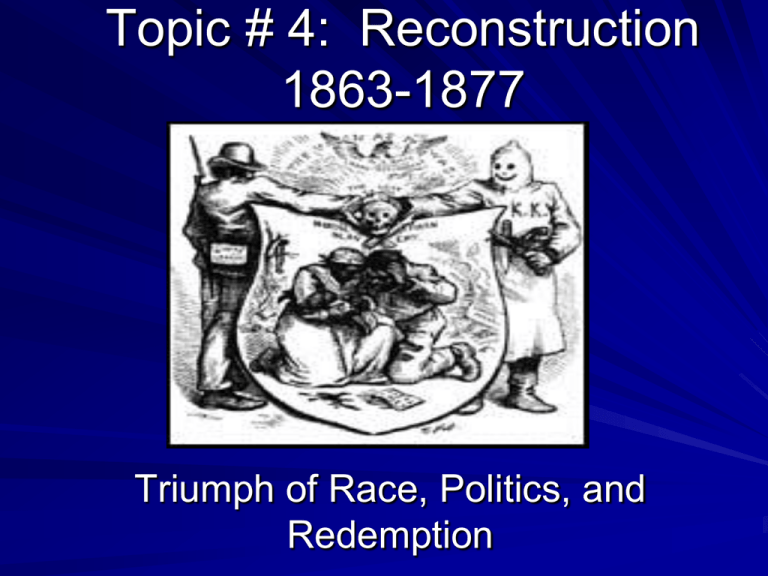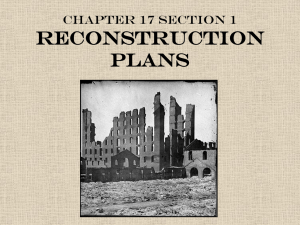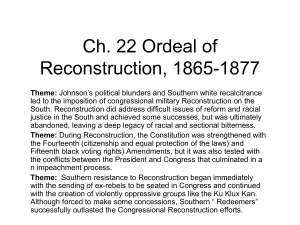Reconstruction PP - Hart County Schools
advertisement

Topic # 4: Reconstruction 1863-1877 Triumph of Race, Politics, and Redemption Reconstruction Begins Reconstruction- the period in U.S. history immediately following the Civil War Goal was an easy peace to shorten war – Allow Southern states to rejoin the Union. – Main goal was not necessarily to end slavery, but to unify the United States. Lincoln’s 10% Plan – States could be readmitted into the Union when 10 percent of voters had taken an oath of allegiance to the U.S. – States must pledge their allegiance to emancipation – When the Southern States formally abolished slavery (constitution) they would be recognized Who Controls Reconstruction: Congress or President? Wade-Davis Bill: program proposed for the Reconstruction of the South written by two Radical Republicans – Senator Wade of Ohio and Representative Davis of Maryland. – Plan much more strict than Lincolns plan – In order for Southern States to be readmitted, they must take an oath saying they never supported the Confederacy during the Civil War. – Required new State Constitutions that banned Slavery Lincoln’s Response Wade-Davis Bill was passed in the Senate and the House. – Lincoln steps in Pocket Veto: legislative maneuver that allows the President to indirectly veto a bill. – Lincoln uses the pocket veto and the Wade-Davis Bill is never made a law Lincoln’s plan was based on forgiveness and unity. Lincoln quote: “Malice towards none Charity for All” Assassination of a Hero Ford Theatre- April 14, 1865- “Our American Cousin” John Wilkes Booth A Confederate sympathizer murders Lincoln during play Assassination of Lincoln left questions unresolved when Andrew Johnson became president. Lincoln’s Second Inaugural With malice toward none; with charity for all; with firmness in the right, as God gives us to see the right, let us strive on to finish the work we are in; to bind up the nation's wounds; to care for him who shall have borne the battle, and for his widow, and his orphan--to do all which may achieve and cherish a just and lasting peace, among ourselves, and with all nations. The Freedmen 13th Amendment was passed in 1865 – made former slaves freedmen – the Black Codes still prevented voting rights – led to questions about voting rights for African American males Freedmen faced several problems: – couldn’t read or write – owned no land – had no money to buy land – jobs were scarce Freedman’s Bureau Freedmen's Bureau- established in the War Department on March 3, 1865. – Aid former slaves through education, health care, and employment. – Assumed custody of confiscated lands or property in the former Confederate States. – Built Schools- many of whom are “Historically Black Colleges” in the South. – Very important in the advancement of Civil Rights!!! Freedman’s Bureau Schools Reconstruction EQ’s #1 1. Define Reconstruction. Who won the major event that was going on prior and during Reconstruction? 2. Compare and Contrast Lincoln’s plan for Reconstruction with the Wade-Davis Bill. 3. Define Pocket Veto. How did Lincoln utilize the pocket veto? 4. Explain the circumstances surrounding the assassination of President Lincoln. Who was the assassin? Where did it take place? Radical Republicans Radical Republicans: opposed to slavery during the war, and supported equal rights for freedmen (the newly freed slaves) Goals of Radical Republicans: – Ensuring the right to vote for freedmen – Passage of the Reconstruction Acts – Harsh treatment of ex-Confederates Radical Republicans opposed Lincoln’s TenPercent plan Believed that the next President, Andrew Johnson, was their man (not the case) Andrew Johnson Democrat from Tennessee Initially supported by Radical Republicans Johnson’s Plan – similar to Lincoln’s – Led to southern elections that voted in former confederate leaders. – Led to the Black Codes – Now enemy to Radical Republicans – Plan viewed as too lenient A Unified Congress? New southern state govts. elected representatives to Congress (former Confederate leaders) Dec. 1865, Congress meets – Republican majority refused to seat the new southern reps. – Joint Committee of Reconstruction: was set up to investigate new Southern state governments. 1866: Civil Rights Issues Committee met in spring 1866 1. Hatred for the Union 2. Love for the Confederacy 3. Existence of Black Codes – laws that prevented rights of African Americans Civil Rights Act of 1866: gave African Americans U.S. citizenship but not right to vote. – Johnson vetoes, Congress overrides Freedmen’s Bureau: up for renewal – Johnson vetoes, Congress overrides A Guarantee of Citizenship Congress proposed 14th Amendment (1866) to guarantee rights of African Americans forever – extended equal citizenship to all – denied states the right to deprive anyone of life, liberty, or property w/o due process – promised all citizens equal protection of the laws Voting Rights at Last – two years later the 15th Amendment was ratified it gave African American males the right to vote in all states – some women campaigned for their suffrage too Military Reconstruction Act: 1867 Republicans gained majority in Congress in 1866 elections Military Reconstruction Act: southern states were put under military supervision until they were readmitted Southern States—except Tn.—would write new constitutions w/ Universal Adult Male Suffrage: all males could vote. States had to ratify 14th amendment Gave Army power to register voters and to disqualify “disloyal persons” from registering. Reconstruction EQ’s #2 1. Describe Andrew Johnson’s Reconstruction 2. 3. 4. 5. Plan. To which plan was it most comparable? Who were the Radical Republicans? Describe 3 of their goals. Of the 3 Reconstruction plans, which plan would the Radical Republicans support? Why? Describe the 13th, 14th, and 15th amendments to the U.S. Constitution. Discuss why 1866 could be viewed as “the year of civil rights.” Explain key events. Struggle for Power By 1870, Southern states were readmitted Some had to ratify 15th amendment Radical Republicans believed Johnson hindered their efforts toward Reconstruction – Needed to be removed from office – Intentionally violated the Tenure of Office Act – Impeachment report was prepared the same day Johnson was impeached by the House Avoided removal from office by one vote – Power/influence was gone – Congress won the right to control Reconstruction Southern Politics Change Freedmen could participate in southern politics Former Conf. officials could not - two groups of whites were significant: Carpetbaggers: Northerners who went South during Reconstruction – some sought personal gain only – others tried to help (ministers, teachers, etc.) Scalawags: white Southerners who supported the federal reconstruction plan – Make money or gain political office – Republican rule was best for the South Southern Radicalism Congressional reforms & increase of African American rights prompted anger/resentment from southerners – believed economic growth was being hindered – resented freedmen’s rights to vote/hold office – wanted to end influence of carpetbaggers, scalawags, & African Americans – Ku Klux Klan: Committed acts of terrorism against African Americans and Republicans. Congress reacted by passing legislation – 3 Enforcement Acts passed to prevent violence – Decrease of KKK activity – threat of violence still remained A Changing Political Landscape 1867, Radical Republicans were at their peak 1870 all southern states had rejoined the Union Republicans struggled to hold on to power Tried to hold power by electing Grant president in 1868 & 1872 – War hero for the Union – Presidency undermined by scandal – Not much energy left for Reconstruction Radicals gradually began to lose power in the South over the next 10 years 1876 Presidential Election Rep. nominated Rutherford B. Hayes Dem. nominated Samuel J. Tilden Tilden won the popular vote but . . . – electoral votes were disputed in four states- FL, SC, LA, OR – both sides had used fraud & intimidation at the polls – resulted in two different sets of electoral votes Special electoral commission decided the Republican votes were the real ones Commission made Hayes the new president Hayes names Southerner to cabinet – Army withdrawn from south A Compromise Dem. refused the decision until a compromise was reached- Comp. of 1877 - Rep. promised: 1) Dem. could take over govts. in LA, SC, & FL 2) to remove remaining troops from the South 3) to provide federal aid for rebuilding the South – Dem. promised to treat blacks fairly & to protect their rights A New South Emerges – Industrialization in the South; economies struggle – Planters must work for themselves – Poor farmers had 2 choices. The New South Tenant Farmers: Farmer who resides on and farms land owned by a landlord. Sharecroppers: a landowner allows a tenant to use the land in return for a share of the crop produced on the land. Jim Crow Laws established legalized segregation in the south Court case Plessey vs Ferguson said separate but equal was ok Mandated segregation in all public facilities The End of Reconstruction Reconstruction ended in 1877 w/ Compromise of 1877 Dem. controlled govts. throughout the South Negatives South had still not recovered economically Racism still existed & would continue to be a problem- KKK Women’s Rights?? Positives 3 amendments had been ratified African American participation in politics Universal Manhood Suffrage “Boy, You ain’t a votin’ here”! Acts of Terrorism











